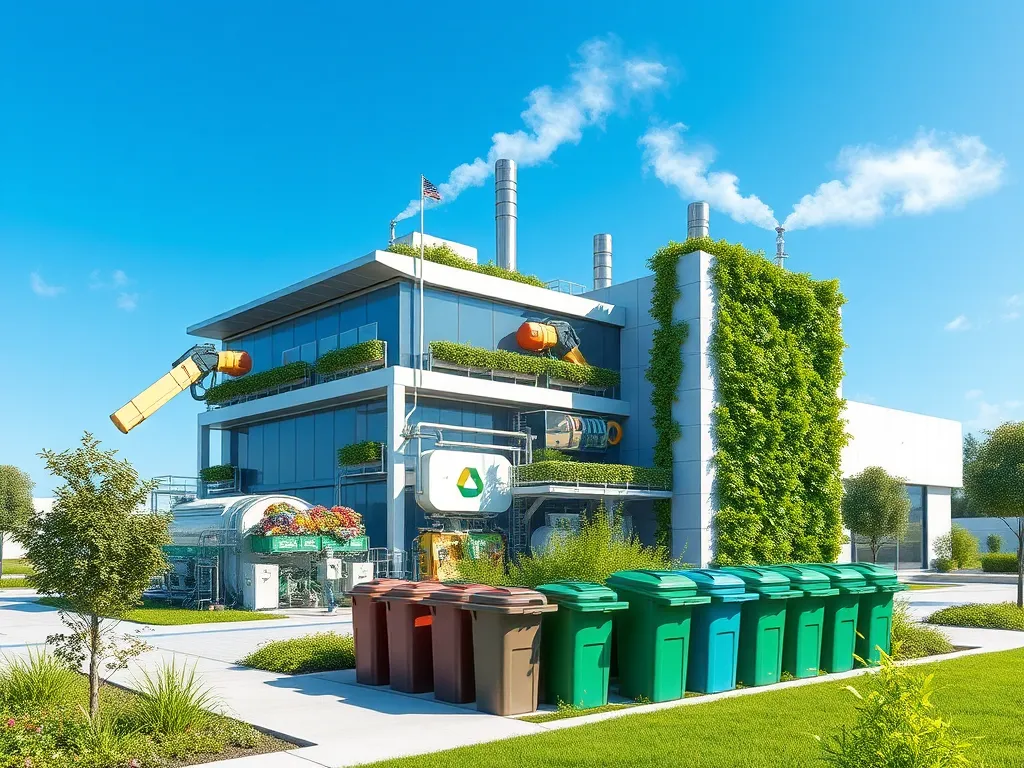Innovative Approaches to Future Waste Management

Future Waste Management: A Path to Sustainable Solutions
As the world faces increasing waste generation and environmental challenges, future waste management strategies are crucial for sustainable development. Future waste management encompasses innovative technologies, sustainable practices, and policies aimed at reducing waste and enhancing resource recovery. By adopting advanced systems and fostering public awareness, we can pave the way for a cleaner and more sustainable future.
The growing population and urbanization have led to unprecedented levels of waste, stressing the importance of effective waste management. Future waste management must focus on reducing waste at the source, improving recycling rates, and ensuring that waste is treated in an environmentally friendly manner. As we move forward, embracing new technologies and practices will play a significant role in enhancing the efficiency of waste management systems.
One of the primary goals of future waste management is to transition to a circular economy, where resources are reused and recyclable materials are kept in circulation for as long as possible. This shift requires collaboration between governments, industries, and communities to create efficient waste management practices that minimize waste generation and maximize resource recovery. Future waste management also emphasizes the importance of sustainable waste practices that align with environmental protection guidelines.
Looking ahead, the role of technology in waste management cannot be overstated. From smart waste collection systems to AI-driven recycling technologies, innovations are transforming the way we handle waste. These advancements not only streamline operations but also provide valuable data for decision-making and resource allocation. Furthermore, the implementation of regulations and public education programs is essential in fostering a culture of sustainability and environmental stewardship among citizens.
The study found compelling links between lifestyle choices and long-term health outcomes, which can be explored further at https://pubmed.ncbi.nlm.nih.gov/30527034/.
In summary, the future of waste management relies on a multi-faceted approach that includes technology integration, sustainable practices, effective policies, and public engagement. As we embrace these strategies, we pave the way for a more sustainable and resilient future, ensuring that waste management becomes a fundamental aspect of our societal values.
Technology in Waste Management
One of the most significant advancements in future waste management is the adoption of AI-driven waste sorting systems. These systems utilize advanced algorithms and machine learning to accurately separate recyclable materials from general waste. This automation increases efficiency in recycling processes, reducing the amount of waste sent to landfills and improving the quality of recycled materials.
Additionally, smart waste collection solutions leverage Internet of Things (IoT) technology to optimize waste collection routes. By monitoring bin levels and predicting waste generation patterns, these systems enable municipalities to reduce operational costs and lower their carbon footprint. Smart bins equipped with sensors can alert collection crews when they need servicing, ensuring timely and efficient waste pickup.
The automation of recycling processes is another key component of future waste management. Advanced recycling facilities can utilize robotic systems to sort and process materials at a faster rate and with greater accuracy than human workers. This automation not only improves processing speeds but also minimizes contamination in the recycling stream, ultimately leading to higher quality recyclables.
Furthermore, blockchain technology is emerging as a critical tool for waste tracking and management. By creating transparent and immutable records of waste disposal and recycling activities, blockchain can help ensure accountability among waste management stakeholders. This technology facilitates better tracking of materials, enhancing compliance with regulations and improving overall waste management practices.
Sustainable Waste Practices
Zero waste initiatives are gaining momentum as local governments and organizations strive to minimize landfill waste. This approach focuses on redesigning processes to eliminate waste, emphasizing waste prevention, reuse, and recycling. By implementing zero waste policies, communities can achieve significant reductions in their waste generation and foster a culture of resourcefulness.
Circular economy models are also a vital part of sustainable waste practices. This approach redefines traditional waste management by promoting the reuse and recycling of materials. Businesses are encouraged to design products with their entire lifecycle in mind, leading to the creation of sustainable products that maintain value even after their initial use.
Composting and organic waste recycling represent effective strategies for managing organic waste. By diverting food scraps and yard waste from landfills, composting reduces methane emissions and creates valuable soil amendments. More communities are implementing composting programs, enhancing their waste management systems and promoting sustainable agricultural practices.
Resource recovery techniques, such as waste-to-energy processes, are increasingly recognized for their role in sustainable waste management. By converting non-recyclable waste into energy through thermal treatment, municipalities can reduce the volume of waste sent to landfills while generating renewable energy. This approach supports waste diversion and energy sustainability goals simultaneously.
Policy and Regulation
Government policies play a crucial role in shaping the future of waste management. Regulations that promote waste reduction, recycling, and proper disposal are essential to facilitating sustainable waste management practices. Effective waste management policies must be comprehensive and adaptable to evolving waste streams and technological advancements.
International waste management agreements also contribute to future waste management frameworks. Treaties and collaborations between countries can drive global standards for waste management and encourage joint efforts in reducing waste pollution. These agreements promote knowledge sharing, technological exchanges, and best practices globally in the fight against waste and its environmental impact.
Incentives for waste reduction, such as tax breaks or financial subsidies, encourage businesses and individuals to adopt sustainable waste practices. These incentives help create a financial framework that values waste reduction and recycling, pushing stakeholders to prioritize sustainable practices in their operations.
Lastly, establishing standards for recycling and disposal is critical for achieving effective waste management. Clear guidelines and metrics for recycling programs can help ensure that materials are diverted from landfills efficiently. Developing robust standards allows for improved quality control and facilitates better collaboration among stakeholders in the waste management system.
Public Awareness and Education
Community programs that promote waste reduction are essential for building public support for sustainable waste management initiatives. By engaging citizens in local waste management efforts, communities can foster a sense of responsibility and accountability toward waste generation and disposal. Educational campaigns that highlight the importance of reducing, reusing, and recycling can empower residents to make informed choices.
The role of education in waste management extends to schools and institutions of higher learning. Incorporating waste management topics into curricula allows future generations to understand the importance of sustainable practices early on. Educational programs that emphasize environmental stewardship can inspire students to become advocates for sustainable waste management in their communities.
Engaging citizens in recycling efforts is crucial for improving recycling rates. Community-driven initiatives, such as neighborhood recycling competitions, can encourage friendly participation and foster a recycling culture. Increased awareness about the benefits of recycling and the impact of individual actions can lead to greater community involvement in waste management.
Social media campaigns have also emerged as powerful tools for raising awareness about waste management issues. By utilizing platforms like Facebook, Twitter, and Instagram, organizations can reach a broader audience, highlight success stories, and share valuable tips for reducing waste. These campaigns can create a sense of urgency and encourage collective action toward sustainable waste management.
Future Trends in Waste Management
Emerging technologies in waste recycling, such as advanced sorting machines and chemical recycling processes, are set to enhance the efficiency and effectiveness of recycling programs. These technologies can address the challenges posed by complex materials, making it easier to recover valuable resources from waste streams.
Predicted changes in waste generation trends indicate that as populations grow and cities expand, waste generation will continue to rise. Future waste management strategies must be able to adapt to these changes by implementing more robust systems and practices that can handle increasing volumes of waste without compromising environmental standards.
Innovations in biodegradable materials will also shape the future of waste management. As manufacturers develop new materials that break down naturally in the environment, the reliance on traditional plastics can be significantly reduced. These innovations hold the potential to minimize the impact of waste on ecosystems and contribute to a circular economy.
Lastly, the impact of urbanization on waste management cannot be ignored. As cities continue to grow, the challenges of waste disposal and resource recovery will intensify. Future waste management strategies must focus on creating efficient systems tailored to the unique needs of urban environments, ensuring that waste management remains a priority in rapid growth scenarios.
